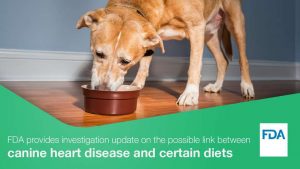
In light of the latest update from the FDA on their investigation involving dietary related DCM, we’re focusing on the canine (and feline!) heart. While DCM related to dietary influence seems to be able to be reversed in some cases, other heart conditions are not so lucky. But that doesn’t mean there aren’t options available to make your pet’s life much more comfortable. Read on below to learn about the heart, and some of the common aliments that plague it.

This press release highlights an update on the FDA’s investigation into a potential connection between certain diets and cases of canine heart disease.
The U.S. Food and Drug Administration has provided an update on its investigation into reports of dilated cardiomyopathy (DCM) in dogs eating certain types of pet food. As part of this update, the FDA is sharing a compilation of adverse event reports of DCM submitted to the agency through April 30, 2019, an updated case count, and new testing results.
For the first time, the agency is also posting the pet food brands most frequently identified in these adverse event reports. It’s important to note that the FDA doesn’t yet know how certain diets may be associated with DCM in some dogs. However, the FDA is first and foremost a public health agency, and takes seriously its responsibility to protect human and animal health. In the case of DCM, the agency has an obligation to be transparent with the pet-owning public regarding the frequency with which certain brands have been reported.
Read more HERE.
Dogs and Heart Disease: An Overview

Heart disease in dogs is almost as common as it is in humans, but unlike people, smoking and a fatty diet are not risk factors. The most common form of heart disease in dogs is valvular disease, which primarily affects small breed dogs over 5 years of age and makes up 70-75% of heart disease in dogs. Heartworm disease causes 13% of heart disease even though it is entirely preventable. Myocardial disease, such as dilated cardiomyopathy, makes up 8% of heart disease and primarily affects large breed dogs of all ages.
Learn more HERE.
According to the American Veterinary Medical Association (AVMA), heart disease in cats affects 1 of every 10 cats worldwide. Heart disease is a condition in which an abnormality of the heart is present. Heart disease in cats is a medical precursor to congestive heart failure in cats, because heart disease can lead to congestive heart failure in cats if untreated.
Heart disease in cats can be either congenital or acquired:
- Congenital heart disease in cats is present at birth, and can be inherited from the parents
- Acquired, or adult onset heart disease in cats often occurs in middle-aged to older animals due to wear and tear on the heart structures, but can also result from an injury or infection
While cardiomyopathy is the most common form of acquired, adult onset heart problems in cats, the two most common types of congenital heart disease in cats are:
- Malformations of a heat valve
- Defects in the wall that divides the right and left halves of the heart
Both types of congenital heart disease cause blood to flow abnormally through the defect. The disturbance in the blood flow causes abnormal vibration or a heart murmur in cats.
There are several possible symptoms of heart problems in cats that cat owners can be on the lookout for, including:
- Lethargy/weakness/inactivity
- Difficulty with or discontinuing exercise
- Shortness of breath or difficulty breathing possibly accompanied by fluid buildup in the lungs and chest
- Sudden paralysis of the hind quarters
- Fast breathing during dormancy (not panting)
- Fainting/collapse
- Chronic coughing
- Regularly elevated heart rate
If this sounds like your cat, be sure to call us to schedule an appointment as soon as possible.
Understanding Congestive Heart Failure in Dogs
Congestive heart failure can be a scary diagnosis to receive from your veterinarian. Sadly, many small breeds as well as some large breeds, are prone to developing this condition later in life. The good news is that with proper treatment and lifestyle management this diagnosis is containable. However, it’s important to recognize the symptoms of congestive heart failure in dogs so that you can begin treatment promptly, giving your beloved pup the best chance of a longer life.
Symptoms to watch for:
- Coughing
- Constant panting
- Struggling to breathe
- Breathing at a fast rate, especially when in a resting state
- Reluctance or refusal to exercise
- Getting tired more easily on walks or during play
- Fatigue
- Blue-tinged gums
- Distended abdomen
- Coughing up blood
- Collapsing
If you are seeing any of the above symptoms, give us a call, and we’ll set up an appointment for you right away.
Canine Dilated Cardiomyopathy (DCM)

Canine dilated cardiomyopathy (DCM) is a primary disease of cardiac muscle that results in a decreased ability of the heart to generate pressure to pump blood through the vascular system. The definitive cause of canine DCM is the subject of debate, although a number of factors including nutritional, infectious, and genetic predisposition have been implicated. The fact that canine DCM occurs at a higher incidence in specific breeds suggests a heritable genetic component to this disease, although it is likely that it’s etiology is multifactorial. Breeds predisposed to DCM include the Doberman Pinscher, the Great Dane, the Boxer, and the Cocker Spaniel. Dietary carnitine deficiency may play a role in some cases of Boxer DCM, and taurine responsive DCM has been identified in Cocker Spaniels.
Learn more HERE.
Heart Valves and Heart Murmurs in Dogs

The mitral valve is one of four valves in the heart that keep blood flowing in the right direction. It is located between the heart’s left atrium and left ventricle. The “lub-dub” sound that we associate with a healthy heart is the sound of heart valves closing; it should be all that a veterinarian hears when listening to a dog’s heart with a stethoscope.
Small breed dogs have a genetic tendency to develop pathological changes to their mitral valves. This is MMVD. We don’t know exactly why or how it happens, but the valve leaflets that are normally thin become irregularly thickened, with bumps developing on the edges in many cases. These changes prevent the leaflets from closing as they should. The valve begins to leak, which causes blood flow around it to become turbulent. The sound that this makes is called a heart murmur.
In the case of MMVD, the murmur occurs between the normal “lub” and “dub” heart sounds. Murmurs can be heard most clearly at a particular point on the left side of the dog’s chest.
Learn more HERE.
